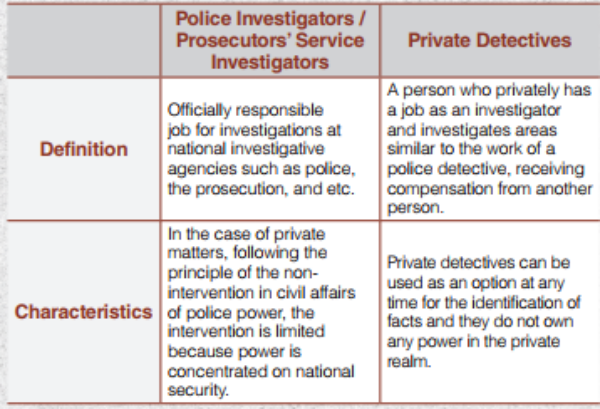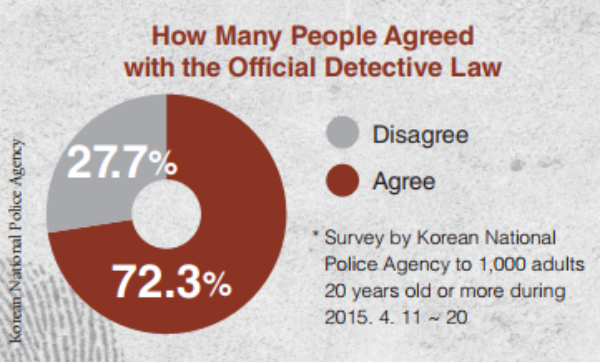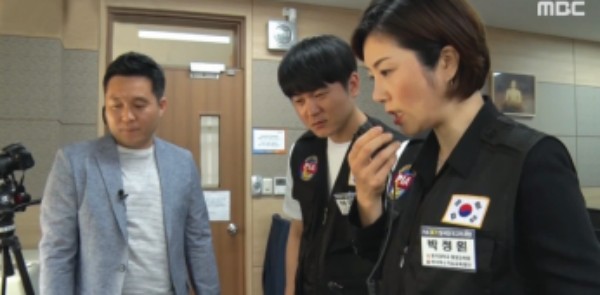The Official Detective Law, which was one of President Moon Jae-in’s elective pledges, was launched last September and is currently pending in the parliamentary bill review to examine the current bill in depth. The Official Detective Law might be a noteworthy legislation in Korea because private detectives are only illegal in Korea among all Organization for Economic Cooperation and Development (OECD) countries. As the bill is proposed, various detective markets are opening up and the employment rate in this field is expected to rise. At this point, the Sungkyun Times (SKT) examines the background of the official detective bill, its contents, and the influences it will bring in the future.
Priavate Detectives Illegal in Korea
What Is a Private Detective?
The definition of a private detective can be understood through the comparison with the concept of police investigators or prosecutors’ service investigators.

The first position of private detective was created in Europe for two reasons. Firstly, it appeared naturally in the process of overcoming the dysfunction of the modern state of bureaucracy, which made citizens start to seek out their own rights since they believed that their legitimate civil and penal rights were not adequately protected by bureaucrats. Next, the structure of the parteienprinzip-based litigation also made individuals feel the necessity of having private detectives. Parteienprinzip-based litigation structure is a system in which citizens’ rights are not passively protected by judicial bureaucrats but only by citizens’ own active litigation activities, and it is now the essential form of the English-American criminal trial system.
Private Detectives in Korea
Private detectives started to emerge in Korea as Koreans started to recognize the limits of the bureaucratic system. Since the physical capacity of the national investigative agency is limited in Korea, it is practically impossible to find missing family members or to handle complaints. According to statistics from the Korean National Police Agency in 2015, one police officer was responsible for dealing with 456 people. In addition, people began to think that not only the nation but also the general public can handle the power themselves. As a result, private institutions such as private security firms and private prisons were established in a relatively short period of time. In the past, Korean private detectives mainly focused on domestic cases such as proving a spouse’s affair. In recent years, however, the working scope has expanded to include cases regarding intellectual property rights such as technology leaks and industrial espionage, as well as collecting evidence for various legal disputes. For instance, corporate detectives are mainly hired by large corporations and probe into investigations involving the corporation or to uncover criminal plots. People seek private detectives to appeal for unfairness in cases where national investigative agencies can hardly help due to their focus on national security. Most of the cases are related to money or affairs.
One of the problems, however, is that all the activities of private detectives in Korea are currently illegal. Those who are illegally investigating in errand centers and commercial agents are the ones who can be called private detectives. According to the Korean National Police Agency, almost 4,000 errand centers were active in Korea by 2016, and these centers are illegally collecting personal information in the name of detecting infidelity or solving problems with debtors who are hard to catch. In the first half of 2013, the Korean National Police Agency arrested 332 illegal errand center employees, and 98% of their activities were related to the collection or leakage of personal information. These illegal centers and private detectives asked for fees in advance, but since there is no cap on costs and requesting help is an illegal act, people cannot appeal for punishment even if it turns out to be a case of fraud. Meanwhile, related legislation has been submitted to the National Assembly of the Republic of Korea several times, but no legislation has yet to reach the final legislation phase so far. This is probably because there was a jurisdictional dispute between institutions such as the Korean National Police Agency and the Ministry of Justice. It is time for necessary measures to be arranged to solve these problems.
Official Detective Law as an Alternative

Due to the fact that national investigative agencies cannot sufficiently protect citizens from social crimes, the social demand for private detectives has been increasing. In a survey conducted by the Korean National Police Agency on 1,000 citizens in April 2017, 72.3% agreed with enacting the official detective law. To form society with a sound legal culture, it is necessary to establish a social system that can legally manage detectives. As an alternative to this problem, the passage of the Official Detective Law has been brought up for a long time.
The Content of the Official Detective Law
Yoon Jae-ok, a member of Saenuri Party, proposed an enactment of the Official Detective Law on September 8th, 2016. The term “detective” in this proposal means a person who collects and provides information to the client who has a legitimate interest in confirming information. In addition, the official detectives here are not civil servants but rather private investigators. According to the proposal, the national official detective qualification system will be introduced, enabling private research services that citizens can trust and use. Appropriate management, supervision systems and punishment regulations will be established to prevent sideeffects such as privacy invasion. Those who want to work as an authorized detective must pass the qualifying examination conducted by the chief of the National Police Agency and complete the registration process. Consequently, many former police detectives with professional criminal investigation abilities are likely to demonstrate their abilities and talents for investigation and become official detectives. Their work is limited as (Table 1).
(Table 1)
- Fact-finding related to the identification of missing people, runaway people, unknown people, and criminals
- Fact-finding related to theft, loss, and whereabouts
- Fact-finding related to clients’ rights protection or damage they received Except for these actions, one cannot take actions that are prohibited or restricted by any other laws.
Moreover, collecting information only within the legal framework is required, as it is to ordinary citizens. In the case of violations, one is charged with fines or imprisonment. For example, if one goes beyond the scope of work or gives out secrets that are found out during investigation process, one will be punished by imprisonment for up to three years or fined up to 30 million. If the bill is passed, President Moon’s presidential election pledge, “Promotion of the Official Detective System to Support Investigation of Facts,” will be processed by the time people are getting ready for the qualifying examination in August of 2018.

Influences of the Official Detective Law
Problems to Be Solved
There are some potential problems that need to be solved if the Official Detective Law is passed. First, the possibility to grant privileges for one’s former department will increase. The Official Detective bills may encourage this phenomenon between the prosecution, police detectives and official detectives. It is highly probable that official detectives who have worked in police agencies or for prosecution offices in the past may collect personal information by taking advantage of their relationships with current civil servants and national investigative agencies. The Korean Bar Association, which is comprised of fourteen local bar associations, also claimed that it is impossible to collect important personal information without affiliation with national investigative agencies.
Moreover, this is because the currently proposed bill gives jurisdiction over the detective business. In fact, the Korean National Police Agency and the Ministry of Justice are fighting for the jurisdiction of the business. Representative Yoon Jae-ok, who proposed the whole revision bill for the Security Business in November of last year, and representative Song Young-keun, who proposed a bill about Nongovernmental Investigation Business in March of this year, respectively granted jurisdiction to the Korean National Police Agency and the Ministry of Justice. The fact that Yoon is a former police officer who graduated from the Korean National Police University, while Song proposed the bill with members from the Ministry of Justice is critical. According to a parliamentary official, each institution wants to gain the jurisdiction because a new source of income is created, subjects and questions of the qualifying examination can be made advantageously to respective sides, and staff members of the official detective association can also be assigned by themselves. Therefore, in order to solve the problem of granting privileges for one’s former post, a plan that can manage income and examinations should be prepared clearly and fairly. Next, there may be conflicts with the current laws. This means that even if a special act on official detectives is enacted, it may cause conflicts with existing laws. Among them, the current Attorneysat-Law Act is most likely to cause various problems because what it regulates is similar to the content and traits of works that should be handled by official detectives. The Attorneys-at-Law Act was legislated to prevent damages caused by non-lawyer’s advocacy activities and to correct the legislative order. In short, it prohibits anyone except lawyers from conducting any kind of investigative activities. If the Official Detective Law is passed, however, both lawyers and official detectives can identify facts and conduct investigative activities. This social confusion needs revising of the legal order. In fact, in the United States (US) where the detective system also exists, the relationship between lawyers and detectives based on interdependence is increasing. For instance, when a famous football player Orenthal James (O.J.) Simpson was accused of murdering his wife and the trial was in progress, a private detective gathered evidence and witness statements in favor of the defendant and decisively helped his attorneys’ pleas of innocence.
Expected Social Changes
There are problems to be solved, but there are also social changes that the new law will bring: new markets and increased employment. The Korean Private Investigation Association and the Korea Private Investigation Administrator established a detective practice and start-up process on May 25th, 2017, in order to dominate the detective labor supply market in advance. Yoo Ooh-jong, the president of the Association of Korea Private Investigation, said the Official Detective Law is likely to become a reality. Related organizations, therefore, are highly anticipating the bright future of the industry. After the passage of a bill, Kyonggi University estimated in 2013 that a new market of 1.3 trillion per year will be created and the increased employment of 15,000 people will be possible. The previously illegal companies can become legalized and can be included in the estimates, and moreover, they can be used as jobs for former police investigators after their retirement.

It seems that those who have watched Sherlock Holmes and dreamed of becoming a detective will now be able to become a legal one in Korea and start investigating to help citizens. Before that day arrives, however, SKT hopes that all possible problems are fully examined to minimize the social loss, and that the introduction of the official detective system will help solve events that could not be fully solved by the national investigative agencies alone.
